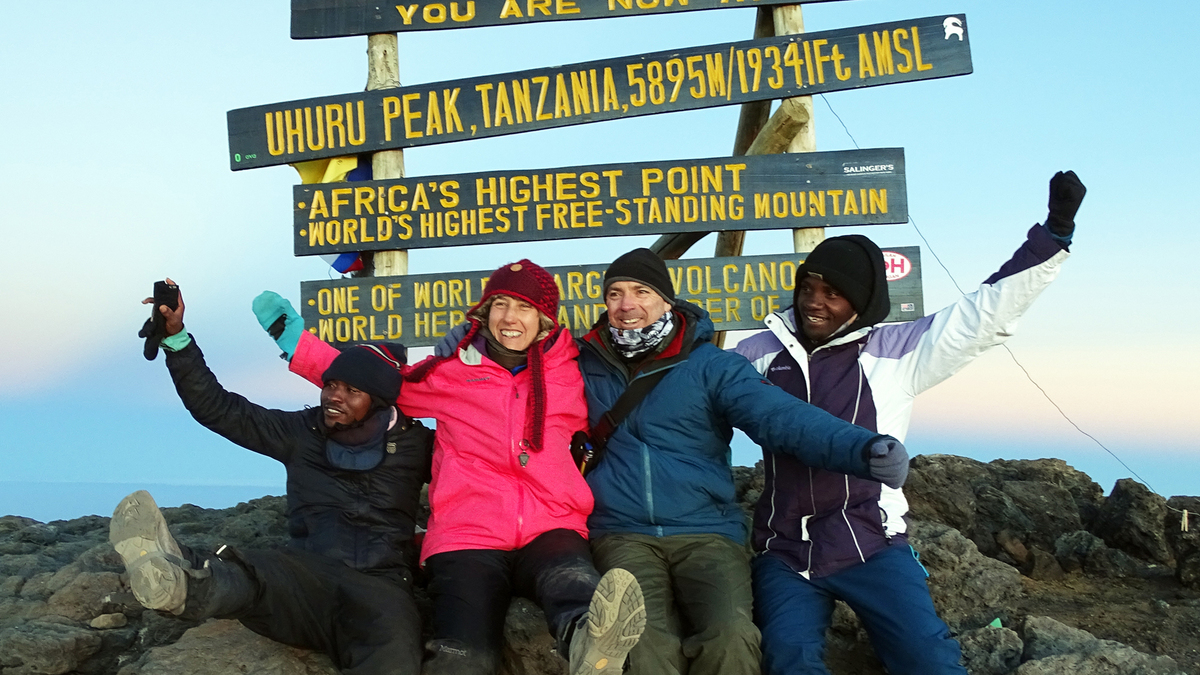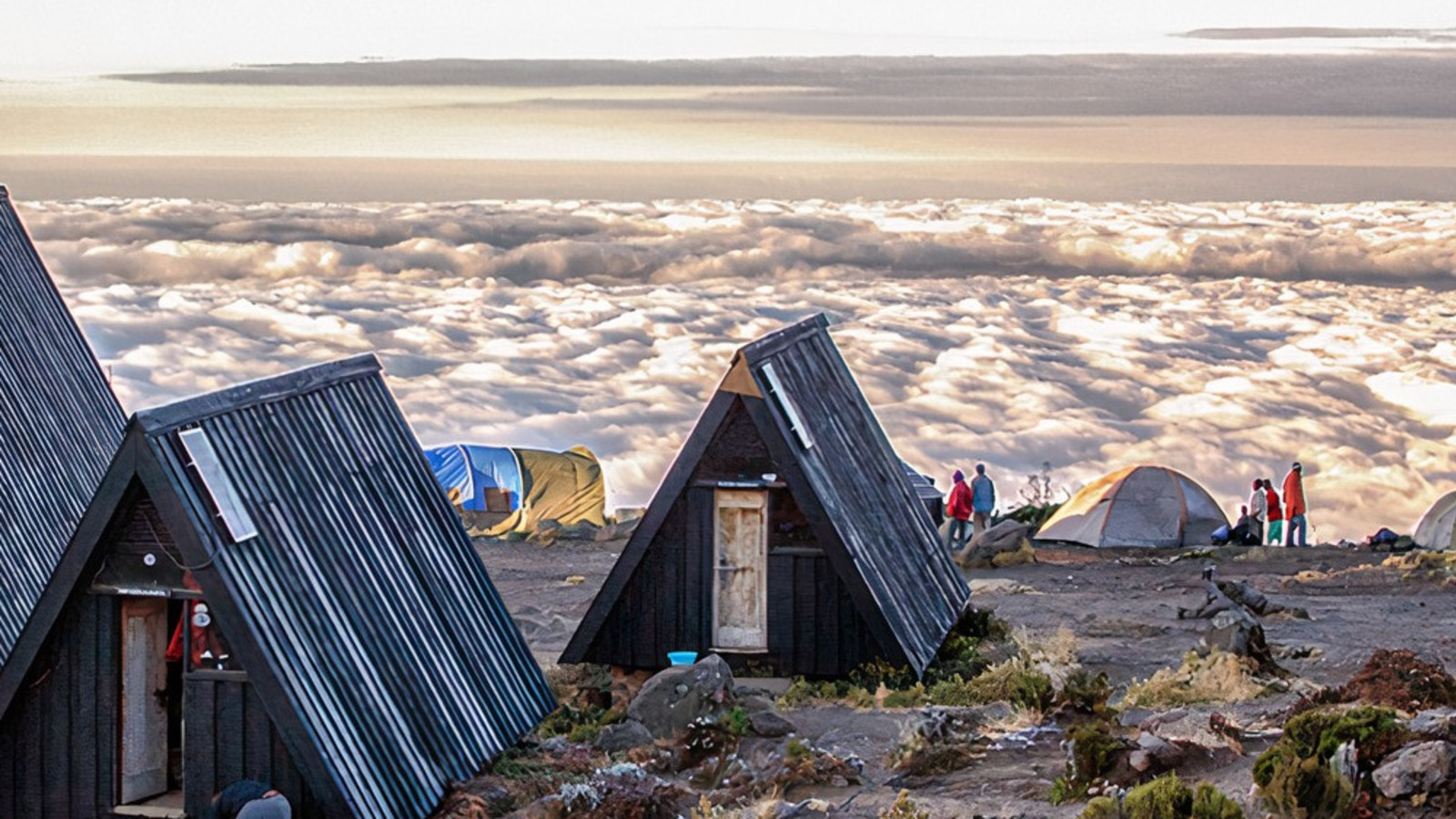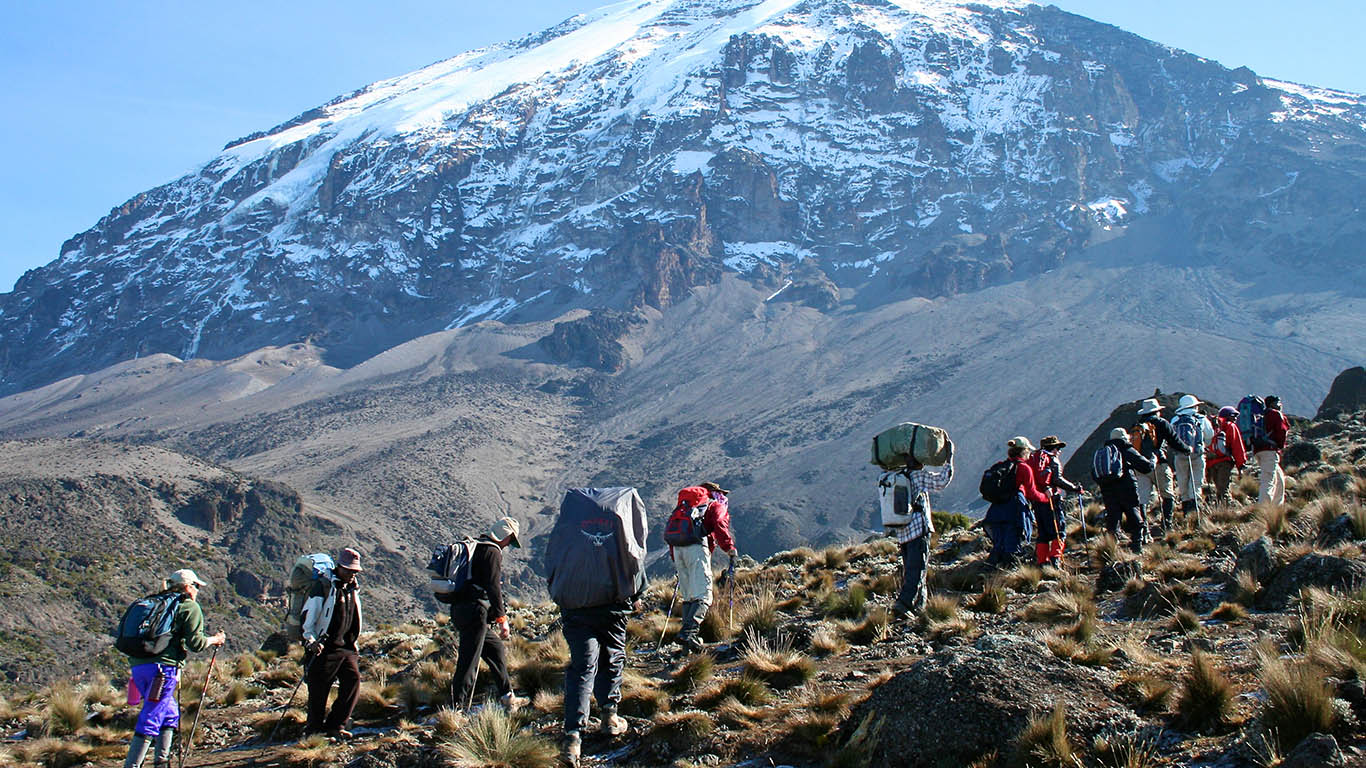7 Day Kilimanjaro Trek Via Lemosho Route + 2 Nights Hotel Stay



Renowned for its breathtaking landscapes, abundant wildlife, excellent acclimatization opportunities, and minimal crowding, the Lemosho route stands out as our top choice for reaching the summit of Africa’s tallest peak. After a scenic 4-hour drive from Moshi to Londorossi Gate, you’ll find yourself on the western slope of Mount Kilimanjaro, where the journey begins towards the iconic Shira Plateau. This route traverses through diverse ecological zones, from lush alpine meadows to eternal ice fields. The ascent is gradual and steady, boasting the highest success rate among all Kilimanjaro routes. Various itinerary options spanning six, seven, or eight days are available, allowing you to tailor your climb according to your available time. Opting for longer programs is always recommended to facilitate better acclimatization. The 6 and 7-day Lemosho itineraries commence with a high-altitude drop-off at 3,500 m/11,500 ft, where you’ll be transported by off-road vehicle to begin your ascent. This strategic starting point is designed to optimize acclimatization, as starting at a higher elevation facilitates smoother adaptation to altitude changes.
Day 00: Arrival
Upon arrival at Kilimanjaro International Airport (JRO), you’ll be warmly greeted by a representative from Kiliholidays who will assist you with your transfer to Weru Weru River Lodge (https://www.weruweruriverlodge.com/ ). The lodge offers all the comforts you need for a pleasant stay, including cozy rooms, hot water, friendly staff, a swimming pool, and internet access. Later in the evening, there will be a briefing session with our managers to ensure you’re fully prepared to begin your climb. Note: Check-in begins at 1:00 PM.
DAY 1: High-Altitude Drop-Off Destination and Trekking to Shira 1 Camp
In the morning, meet with your guide and the mountain support team for another briefing session before embarking on a 3–4 hour journey by vehicle to the western entrance of Kilimanjaro National Park: Londorossi Gate (2,200 m). After obtaining climbing permits and registering with the search and rescue service, the group will proceed to the drop-off point via off-road vehicles, reaching an elevation of 3,500 meters. Here, you’ll be greeted by stunning views of the Shira Plateau. The trek from the drop-off point to the first high-altitude camp, Shira 1, involves a slight gain in altitude and is not overly strenuous, allowing for proper acclimatization. Upon arrival at the camp, our experienced mountain crew will take care of everything, including setting up tents and preparing dinner. It’s essential to follow instructions carefully from this point onwards, including abstaining from alcohol and caffeine, staying hydrated by drinking over 4 liters of bottled water daily, and taking Diamox to alleviate symptoms of altitude sickness. Breakfast, Lunch, Dinner.
- Elevation: 3,500 m to 3,505 m
- Hiking Time: 1-2 hours Distance: 5 km
- Difficulty: Low
- Habitat: Meadows
DAY 2: Trekking from Shira 1 Camp to Shira 2 Camp
Departing from Shira 1 Camp (3,505 m), enjoy a leisurely trek to the second high-altitude camp, Shira 2 Camp (3,900 m). This segment of the trek offers spectacular views of Africa and the unique flora of Kilimanjaro and its surroundings. Shira 2 Camp provides an excellent vantage point for viewing Mount Meru, weather permitting. Upon reaching camp, enjoy lunch before embarking on a two-hour acclimatization hike towards Lava Tower Camp, which features a 200-meter gain in altitude. It’s crucial to take these acclimatization hikes seriously as they increase your chances of summiting Kilimanjaro successfully and help prevent altitude sickness. Breakfast, Lunch, Dinner.
- Acclimatization Hike Destination: Shira 2 Camp (3,900 m) — Route to Lava Tower (4,110 m)
- Hiking Distance: 2 km
- Hiking Time: 1–2 hours Elevation: 3,505 m to 3,900 m
- Hiking Distance: 7 km
- Hiking Time: 3-4 hours
- Distance: 7 km
- Difficulty: Low
- Habitat: Moorland
- DAY 3: Trekking from Shira 2 Camp to the Lava Tower and Descend to Barranco Camp
After breakfast, depart Shira 2 Camp (3,900 m) and trek to the key point of the route: Lava Tower (4,630 m). This section of the route involves numerous ascents and descents, culminating in a camp at over 4,600 meters. While the terrain may be challenging and discomforting, spending at least 1–2 hours here is crucial for successful acclimatization. Lunch will be served at Lava Tower before descending to Barranco Camp (3,960 m). Here, you’ll encounter the famous Barranco Wall, known for its imposing size and steepness. Breakfast, Lunch, Dinner.
- Elevation: 3,900 m to 4,630 m; 4,630 m to 3,960 m
- Hiking Time: 6-8 hours
- Distance: 12 km
- Difficulty: Medium Habitat: Moorland
DAY 4: Trekking from Barranco Camp to Karanga Camp
Start your day early with breakfast before tackling the ascent of the Barranco Wall, a relatively straightforward hike taking about an hour. Afterward, take a break to admire the Kibo volcano before embarking on a more challenging hike to Karanga Camp. This segment of the trek involves numerous ascents and descents, but our expert guides will ensure an optimal pace for the group. Upon reaching camp, enjoy a warm lunch before completing an acclimatization hike towards Barafu Camp with a 200-meter gain in altitude, followed by a descent back to camp. Breakfast, Lunch, Dinner.
Acclimatization Hike Destination: Karanga Camp (4,035 m) — Route to Barafu Camp (4,640 m) Hiking Distance: 2.5 km Hiking Time: 1–2 hours Elevation: 3,960 m to 4,035 m Hiking Time: 4-5 hours
- Distance: 5 km
- Difficulty: Medium
- Habitat: Moorland
DAY 5: Trekking from Karanga Camp to Barafu Camp
In the morning, after breakfast, begin your journey to Barafu Summit Camp (4,640 m), the starting point for your summit attempt on Uhuru Peak (5,895 m) later that night. Our team will have set up camp for you in advance, allowing you to relax upon arrival. After regaining your strength, embark on an acclimatization hike towards the intermediate Kosovo Summit Camp (4,800 m) before returning to Barafu Camp for a hot dinner. Spend the remainder of the day resting and sleeping in preparation for the night summit. Breakfast, Lunch, Dinner.
- Acclimatization Hike Destination: Camp in Elevation: Barafu Camp (4,640 m) — Kosovo Camp (4,800 m)
- Hiking Distance: 2 km
- Hiking Time: 1–2 hours
- Elevation: 4,035 m to 4,640 m
- Hiking Time: 4-5 hours
- Distance: 6 km
- Difficulty: Medium
- Habitat: Alpine desert
DAY 6: Ascent to Uhuru Peak and Descent to Millennium Camp
Depart from Barafu Camp (4,640 m) during the night to begin your ascent of Kilimanjaro towards Uhuru Peak (5,895 m). While technically not a difficult climb, the high altitude presents the most significant challenge. Each pair of climbers will be accompanied by a personal guide throughout the ascent to monitor your physical and mental well-being. After reaching Uhuru Peak, you can descend to the nearest glacier if desired before returning to Barafu Camp. After a 2-hour rest, continue your descent to Millennium Camp (3,820 m). Note: Keep in mind that 90% of all accidents occur during the descent, so please pay close attention to your footing to avoid injury, especially to your toenails. Breakfast, Lunch, Dinner.
- Elevation: 4,640 m to5,895 m; 5,895 m to 3,820 m
- Hiking Time: 8-12 hours
- Distance: 15 km
- Difficulty: High Habitat: Arctic
DAY 7: Descend from Millennium Camp to Mweka Gate
Awake amidst the tropical rainforest, feeling the relief of reduced altitude and the satisfaction of summiting. After a hearty breakfast, begin your descent towards the park’s exit: Mweka Gate (1,650 m). As you descend, take a moment to reflect on your achievement and enjoy the lush surroundings. Upon reaching Mweka Gate, the entire group will gather to celebrate your accomplishment and share their thoughts in the guestbook. Finally, receive your well-deserved commemorative certificates before being transferred back to Weru Weru Lodge. Breakfast, Lunch.
- Elevation: 3,820 m to 1,650 m
- Hiking Time: 4-5 hours Distance: 12 km
- Difficulty: Low Habitat: Rainforest
DAY 8: Departure
Savor your last moments at the lodge before preparing for your departure. Check-out is at 11:00 AM, but if you have an evening flight, arrangements can be made for a late check-out for an additional fee. Take this time to reminisce about your incredible journey up Kilimanjaro and bid farewell to the majestic mountain. Finally, transfer to the airport for your onward journey.
Inclusions:
- Accommodation: Lodging at Weru Weru River Lodge or similar.
- Meals: Breakfast, lunch, and dinner provided during the trek.
- Transportation: Transfer from Kilimanjaro International Airport to the lodge.
- Trekking Support: Experienced guide and mountain support crew.
- Climbing Permits: Acquisition of necessary permits for Kilimanjaro National Park.
- Equipment: Tents, sleeping bags, and other necessary camping gear.
- Activities: Trekking from Marangu Gate to Mandara Hut, Mandara Hut to Horombo Hut, Horombo Hut to Kibo Hut, and summiting Uhuru Peak.
- Briefings: Orientation and briefing sessions conducted by tour managers.
- Safety Measures: Registration with search and rescue service, as well as guidance on altitude sickness prevention.
- Certificates: Commemorative certificates upon successful completion of the trek.
Exclusions:
- International Flights: Airfare to and from Kilimanjaro International Airport.
- Travel Insurance: Personal travel insurance covering medical expenses, trip cancellations, and emergencies.
- Personal Expenses: Expenses for additional meals, beverages, souvenirs, and optional activities.
- Gratuities: Tips for guides, porters, and other staff members.
- Accommodation Beyond Itinerary: Any additional lodging required before or after the scheduled trekking dates.
- Airport Transfers: Transfers to the airport upon departure beyond the designated schedule.
- Visa Fees: Fees associated with obtaining entry visas for Tanzania, if applicable.
- Medical Expenses: Costs incurred for medical treatment or medications during the trek.
- Optional Activities: Any additional excursions or activities not specified in the itinerary.
What is Mount Kilimanjaro?
- Mount Kilimanjaro is the highest peak in Africa, located in Tanzania. It is a dormant volcano and one of the most iconic mountains in the world.
How tall is Mount Kilimanjaro?
- The summit of Mount Kilimanjaro, called Uhuru Peak, stands at an elevation of 5,895 meters (19,341 feet) above sea level.
How long does it take to climb Mount Kilimanjaro?
- The duration of a Kilimanjaro climb varies depending on the route chosen. Most climbs typically range from 5 to 9 days.
What are the different routes up Mount Kilimanjaro?
- There are several routes to the summit of Kilimanjaro, each with its own characteristics and scenery. Popular routes include the Marangu, Machame, Lemosho, Rongai, and Northern Circuit routes.
Is climbing Mount Kilimanjaro difficult?
- Climbing Kilimanjaro is challenging due to its high altitude, but it doesn’t require technical climbing skills. However, climbers should be physically fit and prepared for the rigors of high-altitude trekking.
Do I need a guide to climb Mount Kilimanjaro?
- Yes, it is mandatory to have a registered guide accompany you on your Kilimanjaro climb. Guides are essential for safety, navigation, and providing support throughout the trek.
When is the best time to climb Mount Kilimanjaro?
- The best times for climbing Kilimanjaro are during the dry seasons, which are typically from late June to October and from December to March. These months offer clearer skies and better trekking conditions.
What should I pack for climbing Mount Kilimanjaro?
- Essential items for climbing Kilimanjaro include proper clothing for varying temperatures, sturdy hiking boots, a good quality sleeping bag, trekking poles, personal medications, and other necessary gear as recommended by your tour operator.
What are the risks of climbing Mount Kilimanjaro?
- The main risks of climbing Kilimanjaro include altitude sickness, which can affect anyone regardless of fitness level, as well as other potential hazards such as extreme weather conditions and physical exhaustion.
Do I need to train before climbing Mount Kilimanjaro?
- Yes, it is highly recommended to undergo physical training and preparation before attempting to climb Kilimanjaro. This can include cardiovascular exercises, strength training, and hiking to build endurance and fitness levels.
